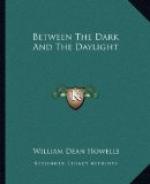“It would be great copy if it were true,” I owned.
Wanhope regarded us all three, in this play of our qualities, with the scientific impartiality of a bacteriologist in the study of a culture offering some peculiar incidents. He took up a point as remote as might be from the personal appeal. “It is curious how little we know of such matters, after all the love-making and marrying in life and all the inquiry of the poets and novelists.” He addressed himself in this turn of his thought, half playful, half earnest, to me, as if I united with the functions of both a responsibility for their shortcomings.
“Yes,” Minver said, facing about towards me. “How do you excuse yourself for your ignorance in matters where you’re always professionally making such a bluff of knowledge? After all the marriages you have brought about in literature, can you say positively and specifically how they are brought about in life?”
“No, I can’t,” I admitted. “I might say that a writer of fiction is a good deal like a minister who continually marries people without knowing why.”
“No, you couldn’t, my dear fellow,” the painter retorted. “It’s part of your swindle to assume that you do know why. You ought to find out.”
Wanhope interposed concretely, or as concretely as he could: “The important thing would always be to find which of the lovers the confession, tacit or explicit, began with.”
“Acton ought to go round and collect human documents bearing on the question. He ought to have got together thousands of specimens from nature. He ought to have gone to all the married couples he knew, and asked them just how their passion was confessed; he ought to have sent out printed circulars, with tabulated questions. Why don’t you do it, Acton?”
I returned, as seriously as could have been expected:
“Perhaps it would be thought rather intimate. People don’t like to talk of such things.”
“They’re ashamed,” Minver declared. “The lovers don’t either of them, in a given case, like to let others know how much the woman had to do with making the offer, and how little the man.”
Minver’s point provoked both Wanhope and myself to begin a remark at the same time. We begged each other’s pardon, and Wanhope insisted that I should go on.
“Oh, merely this,” I said. “I don’t think they’re so much ashamed as that they have forgotten the different stages. You were going to say—?”
“Very much what you said. It’s astonishing how people forget the vital things and remember trifles. Or perhaps as we advance from stage to stage what once seemed the vital things turn to trifles. Nothing can be more vital in the history of a man and a woman than how they became husband and wife, and yet not merely the details, but the main fact, would seem to escape record if not recollection. The next generations knows nothing of it.”
“That appears to let Acton out,” Minver said. “But how do you know what you were saying, Wanhope?”




